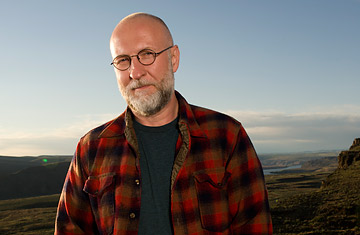
Bob Mould
(2 of 2)
Mould's life after Hüsker Dü becomes a personal and professional liberation. His first solo album wins wide acclaim, and Sugar becomes a money-making darling of the mid-1990s "alternative rock" scene. During this time Mould (who confesses that Hüsker Dü's legacy doesn't interest him nearly as much as it does his fans) seems to hit his fullest creative potential. "My imagination was on fire," he says of one song-writing session that follows a tempestuous fight with a longtime boyfriend. "I was out of my f---ing mind with white-hate-light-energy-noise." The result is the thrillingly maniacal Sugar EP, Beaster.
But perhaps nothing is more important than the 1995 interview Mould grants to Spin magazine finally admitting his sexuality in public. It's a cathartic event, and one that helps allow Mould to start living the openly gay lifestyle he had repressed for so long. (So does a startling trauma from his childhood that he later unearths through therapy.) He recounts timidly scoping out a local gay coffee shop after his 1998 move to New York City: "I would duck in, grab a cup of coffee, then sit slightly away from the building, watching and observing how everyone carried themselves...I could command an audience of sixty thousand people, but I wasn't sure how to act at a gay coffee shop." (Although Mould discussed it directly with his parents, he says that to this day his father refuses to acknowledge his homosexuality.)
As Mould integrated into this world, his musical taste trended towards the electronica that he encountered in gay bars and clubs — a sound he wanted to emulate in his own work. It was a far cry from the punk scene of, say, Boston's grungy old Rathskeller club. But, Mould concluded, "I wanted to be a gay man with a gay identity," something that required "abandoning the professional identity I'd built over the past two decades." Well, not entirely. Mould was wounded when a 2002 album dabbling in electronica was a commercial and critical dud that left his fans perplexed. So he found a middle path. Now living in San Francisco, Mould continues to tour with his guitar and still cranks out solid (if lately unspectacular) rock albums for a balding hetero fan base. But he seems to care more about deejaying Blowoff, the large-scale gay dance parties he initiated while living in Washington, D.C., a few years ago.
And unlike his younger self, Mould is finally living an honest and happy life. Sure, there are rough patches, as when his relationship with one longtime partner recently became a "thruple" with a third man, then (surprise, surprise) fell apart. Then there's the rampage of promiscuity whose details ("military porn"; an escort at a Ramada Inn; "getting freaky with some hot leather motorcycle guy in a bathroom stall in a Hamburg fetish club") might unnerve readers with more tender sensibilities.
Mould knows that some of his longtime fans will react that way. But he really doesn't care. "People think Blowoff is funny — ha-ha, Bob is DJing with his shirt off, how silly. They have no idea how much it means to me," he writes. "Now that I've integrated who I am and what I do, I finally feel whole...I'm finally able to enjoy life." For someone who started out as a self-hating alcoholic rocker screaming out his cryptic angst, that's not just a happy ending — that's an amazing plot twist few other rock memoirs can deliver.
